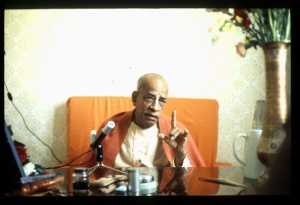CC Adi 16.23 (1975)

A.C. Bhaktivedanta Swami Prabhupada
Below is the 1996 edition text, ready to be substituted with the 1975 one using the compile form.
TEXT 23
- ghare āilā prabhu bahu lañā dhana-jana
- tattva-jñāne kailā śacīra duḥkha vimocana
SYNONYMS
ghare—home; āilā—returned; prabhu—the Lord; bahu—much; lañā—bringing; dhana—riches; jana—followers; tattva-jñāne—by transcendental knowledge; kailā—did; śacīra—of Śacīmātā; duḥkha—the unhappiness; vimocana—relieving.
TRANSLATION
When the Lord returned home, bringing with Him great wealth and many followers, He spoke to Śacīdevī about transcendental knowledge to relieve her of the grief she was suffering.
PURPORT
It is stated in the Bhagavad-gītā (BG 2.13):
- dehino ’smin yathā dehe kaumāraṁ yauvanaṁ jarā
- tathā dehāntara-prāptir dhīras tatra na muhyati
“As the embodied soul continuously passes, in this body, from boyhood to youth to old age, the soul similarly passes into another body at death. The self-realized soul is not bewildered by such a change.” Such verses from the Bhagavad-gītā or any other Vedic literature give valuable instructions on the occasion of someone’s passing away. By discussing such instructions from the Bhagavad-gītā or Śrīmad-Bhāgavatam, a sober man can certainly understand that the soul never dies but rather passes from one body to another. This is called transmigration of the soul. A soul comes into this material world and creates bodily relationships with a father, a mother, sisters, brothers, a wife and children, but all these relationships pertain to the body, not the soul. Therefore, as described in the Bhagavad-gītā, dhīras tatra na muhyati: one who is sober is not disturbed by such phenomenal changes within this material world. Such instructions are called tattva-kathā, or real truth.